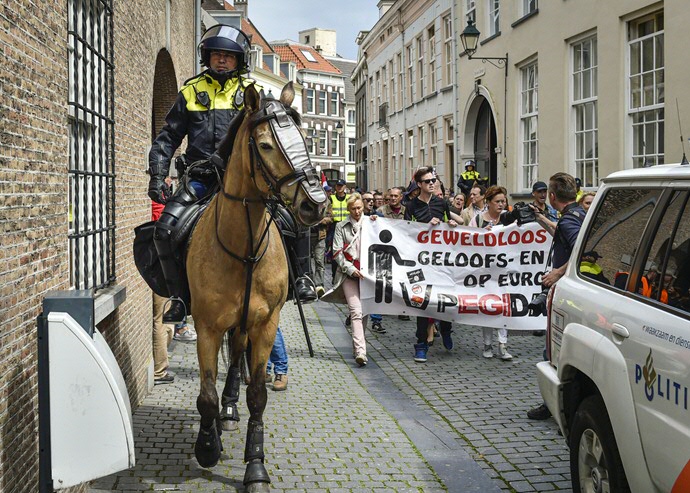‘Government should have no say in what a demonstration is about’

The right to demonstrate, incorporated in the Constitution and worked out in greater detail in the Public Assemblies Act, is in sore need of change on eight points. The freedom to demonstrate could be expanded on various points. In addition, demonstrators themselves must also be made partially responsible for public order and there should be regulations for new forms of demonstrations, such as tent camps. Above all, government must not be allowed to have anything to do with what a demonstration is about. This is what the Groningen lawyer Berend Roorda claims in his PhD thesis, in which he compares the Dutch right to demonstrate to those of Germany and the United Kingdom. His recommendations are currently being discussed at the Ministry of Security and Justice.
The right to demonstrate is inextricably linked to our democratic constitutional state. It is therefore used very often. In the last 15 years in particular, the number of demonstrations has grown explosively. In ‘demonstration capital’ the Hague, for example, numbers rose from 350 in 2002 to 1500 last year. It is up to the authorities, both the legislator and the mayor, to allocate space to the demonstrators without that being too much at the cost of others. The Public Assemblies Act provides the framework for this. In its turn, the Act must satisfy European rules.
European Court
Precisely because the number of demonstrations has increased so much and new types of demonstrations have been added, it is high time to review the existing Act, says Roorda. ‘The current Act is too vague. In addition, the Public Assemblies Act as does not completely comply with the decisions of the European Court of Human Rights, and international organizations such as the OSCE and the UN are critical about a number of provisions in the Dutch Act.
Swastika
Roorda has examined these international law sources and compared the Dutch situation with those of Germany and the United Kingdom. ‘One important bottleneck is the assessment of demonstrations regarding content. Currently the Netherlands is still liberal when compared to its neighbours, where limitations are placed on what can be said or what can be written on banners. But the pressure is increasing here too. Examples include the recent ban by the Mayor of Amsterdam forbidding a Pegida demonstration to use a swastika, or the intention of Minister van der Steur of Security and Justice to significantly limit Salafist demonstrations. My advice to the authorities is not to interfere in advance in any way with the content. It’s not for nothing that we have included that principle in our Constitution, and it is also the starting point for European legislation.’
Tent camp
According to Roorda, another way to give demonstrators more space would be to lighten the requirement to inform the Mayor in advance. The European Court has decreed that a demonstration cannot simply be forbidden just because it did not satisfy this requirement. In addition, Dutch demonstrators, just like those in Germany and the United Kingdom, could be made themselves partially responsible for public order. A police presence often needlessly aggravates the atmosphere, according to Roorda. He also recommends tailoring the legislation to new developments, for example setting up multi-day tent camps: ‘Here, too, you can see the tension between public nuisance and the right to demonstrate. You could, for example, ban demonstrations at night using tents.’
Curriculum Vitae
Berend Roorda (Leeuwarden, 1987) studied Law at the University of Groningen. He assisted on an evaluation of the Public Assemblies Act, and later made it the subject of his PhD thesis, entitled: ‘Het recht om te demonstreren. Een vergelijkende studie naar de betogingsvrijheid in Nederland, Duitsland en Engeland vanuit internationaalrechtelijk perspectief.’ [The right to demonstrate. A comparative study of the freedom to demonstrate in the Netherlands, Germany and the United Kingdom from this perspective of internanional law.] His supervisors were Prof. J.G. Brouwer (UG) and Prof. A.E. Schilder (VU).
The research is funded by the UG, the Politie en Wetenschap programme and the Ministry of the Interior and Kingdom Relations.
More information
More news
-
26 February 2026
What can the law do for women? Join International Women’s Week!
-
08 December 2025
Colourful Characters: Bert Röling
